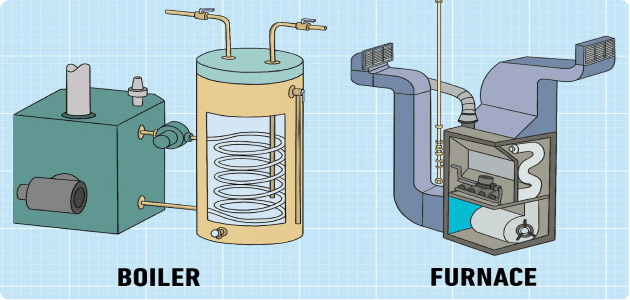What’s the Difference Between Boilers vs. Furnaces?
Here’s an FAQ About the Most Common Ways to Heat Your Home in Northern Virginia

The history of heating systems dates back centuries. Early civilizations used open hearths and wood-burning stoves to provide warmth. As we know them today, boilers emerged in the 18th century for industrial purposes. They were later adapted for home heating and used oil for fuel. On the other hand, furniture gained popularity in the 19th century and tended to use natural gas. With technological advancements, boilers and furnaces have evolved significantly in recent years, each becoming more efficient and reliable. Today, they remain the standard for heating for Northern Virginia homes and commercial buildings, providing warmth and comfort during our chilly winters. We thought it would be good to talk about what makes them different from each other.
1. What's the main difference between boilers and furnaces?
- Boilers: Heat water or a water-antifreeze mixture and circulate it through radiators or baseboards. This system is often used in older homes or areas with colder climates.
- Furnaces: Heat air and blow it through ducts to various rooms. This is the more common heating system in newer homes, especially in warmer climates.
2. Which heating system is quieter?
- Boilers: Boilers are generally quieter than furnaces. The water circulating through the system creates a softer sound than the fan and blower in a furnace.
3. Which system provides more even heat distribution?
- Boilers: Boilers typically offer more even heat distribution. The water-based system can heat larger areas more consistently, especially in multi-story homes.
4. Can both systems provide hot water?
- Boilers: Yes, there are boilers that can also provide heating and hot water. The same water that heats the home can also be used for domestic hot water.
- Furnaces: No, furnaces only provide heating. A separate water heater is needed for hot water.
5. Which system is more cost-effective initially?
- Furnaces: Generally, furnaces have a lower initial cost than boilers. The installation process is often simpler and requires less plumbing work.
6. Which system is easier to maintain?
- Furnaces: Furnaces are generally easier to maintain than boilers. They typically have fewer components and require less specialized maintenance.
7. How do climate conditions affect the choice between a boiler and a furnace?
- Furnaces: Furnaces can be more efficient in colder climates. The warm air can be distributed quickly to heat the entire home.
- Boilers: Boilers might be more suitable for milder climates. The water-based system can provide a more gradual and consistent heat source.
8. What factors should I consider when deciding whether to repair or replace my boiler?
- Age and condition: Consider the boiler's age and the extent of any repairs needed.
- Cost: Compare the cost of repairs to the cost of replacing the boiler.
- Energy efficiency: Newer models are often more energy-efficient, potentially saving energy bills.
- Safety: Replacement may be necessary if the boiler poses a safety hazard.
- Home value: A new boiler can increase the value of your home.
9. What additional considerations exist when converting from a boiler to a furnace?
- Ductwork: If your home doesn't have existing ductwork, installation can be a significant expense.
- Plumbing: Converting from a boiler to a furnace-centered system may require changes to your plumbing system.
- Equipment costs: The cost of a new furnace will need to be compared to the cost of replacing or repairing your boiler.
10. How long can a boiler last?
- Lifespan: A well-maintained boiler can last over ten years. However, its lifespan will depend on factors like usage, maintenance frequency, and the overall quality of the unit.
11. How does energy efficiency compare between old and new systems?
- Efficiency: Modern furnaces and boilers are generally more energy-efficient than older models. Upgrading to a newer model can lead to significant savings on energy bills.
12. What are the ongoing maintenance requirements?
- Maintenance: Both furnaces and boilers require regular maintenance. Consider the ongoing costs of cleaning, inspections, and repairs for each type of system.
Do You Have More Questions About Your Heating System? Call Us!
Each system has its unique advantages, so it’s essential to consider your specific needs and budget seriously. If you want more details or an estimate, call us at IAQ Medics. By understanding the differences and benefits of both systems, homeowners can make informed decisions for efficient and reliable home heating in the Northern Virginia area.
